“Men” takes aim at real-life inspired horror, but it doesn’t seem to know who its audience is or how to properly convey a pervasive terror.
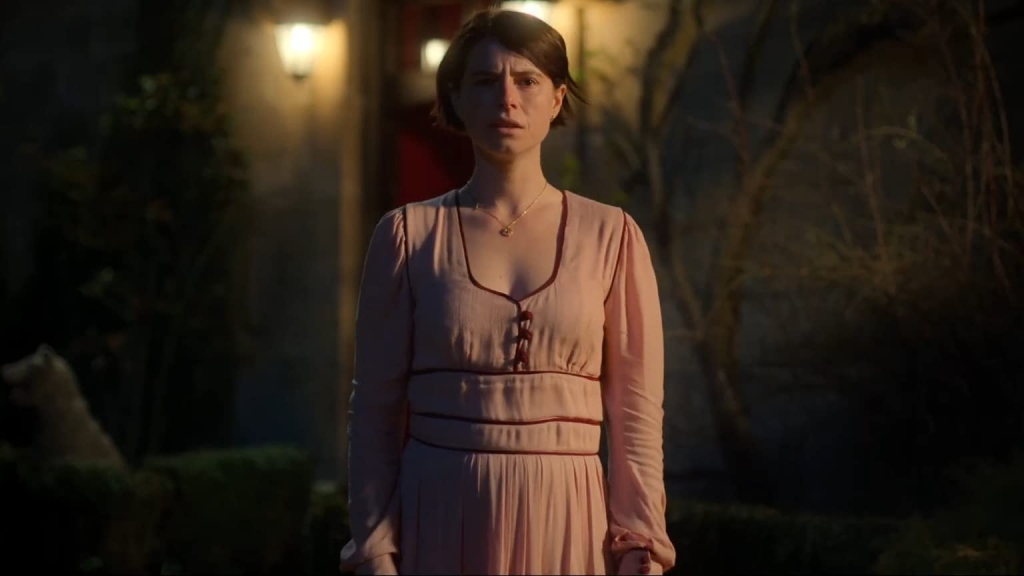
Alex Garland is no stranger to feminist motifs in his work, touching upon creation of patriarchal social contracts in 28 Days Later and feminist posthumanism in Ex Machina. Yet his newest film, of the big and topic-heavy title Men, seems to be an incredibly tone deaf portrayal of relations between genders.
Its hypnotizing visuals and haunting music cannot distract from the fact that the film paints a reductive image of men as universally evil and women as perpetual victims.
The film sees Harper (Jesse Buckley) who after trying to divorce her abusive husband, witnesses his death (presumably by suicide he threatened to commit if she would leave him) and leaves London to heal and rest in a remote country village – Cotson.
There she is welcomed by the obnoxious owner of the estate Geoffrey (Rory Kinnear) and proceeds to descend deeper and deeper into a nightmare of encountering more and more creepy and dangerous men who all share the unpleasant visage of Rory Kinnear.
The film certainly scared me. I was on the edge of my seat.
Yet, I think it is a terrible example of horror cinema. Why? Because it is no feat to make men scary.
One of the first scenes of the taunting of Harper is when she is working in the rented house, headphones in, while the viewer can see through the windows how the naked man — later identified as the mythological Green Man — is walking around in the garden. There is no tension conveyed in the music. The man occasionally looks inside but does not try to get inside until after Harper notices him and calls the police.
I found the beginning of the scene terrifying and uncomfortable, akin to moments in Strangers when the masked intruders stand in the background invisible to the protagonists.
In that case, however, the viewer knows from what the movie told them already that the intruders are dangerous. In the case of Men, that knowledge is seemingly extradiegetic. It is based on the assumption that the viewer is already deadly scared of men. Until very late in the film, it uses that as the base for its scares.
As such, Men commits a great sin of horror filmmaking: it does not convey to the viewer why the circumstance is horrific.
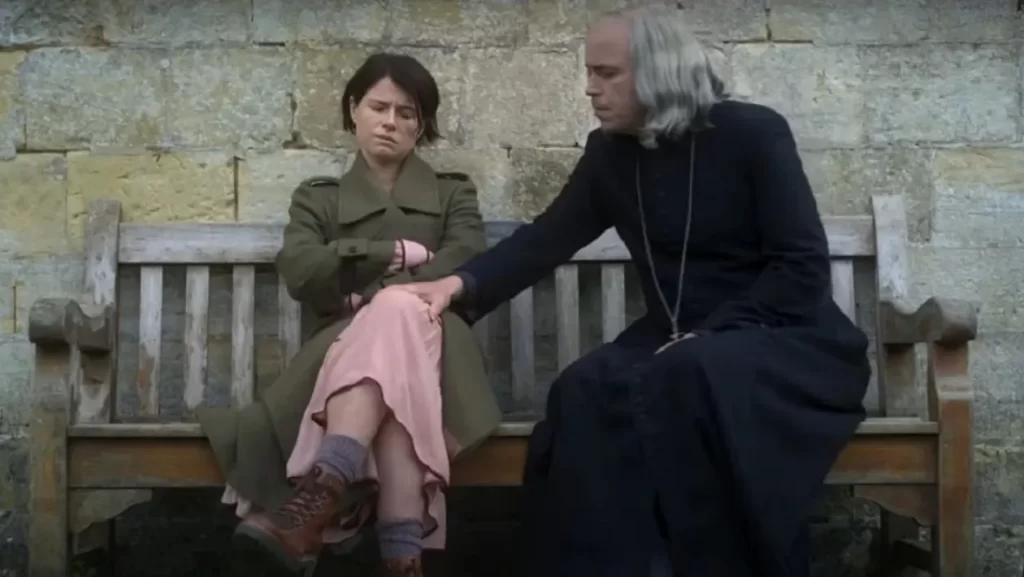
And it would be so easy to do.
The music haunts and draws you in so easily, and the green and desolate English countryside is a perfect background for agoraphobic horror. Yet, it uses those elements mostly to create an atmosphere, without blending them with the subject matter much.
The terrorizing presence of the men of Cotson could be one of the men from anywhere and anytime. Because, for most people who have experienced misogyny, men are dangerous. The terror of Jaws does not come from the audiences fearing sharks from the get go, but from it showing that sharks are something worth being afraid of.
What’s even worse, is that the intended audience of Men is still nebulous.
The film pretends to be a grand biblical-scale allegory, that reveals the truth of the universal and ancient danger men are to women, supposedly revealing this until-now-unknown truth, but does so while assuming that the audience already knows that women should be afraid of men.
So, if it is a film for men — showing that women are afraid of them — it won’t work as a horror movie as it does not convey this terror to an audience, but assumes that the audience already knows it.
But if it is a film for women, then it is not an eye-opening metaphor, but a whimper, a reminder that yes, men are a deadly danger to women.
Except it does not even do that, because, if you’re a woman, you’re acutely aware of that at all times anyway.
The portrayal of stranger men as a tightening circle of predators around Harper is tiring and once again reductive.
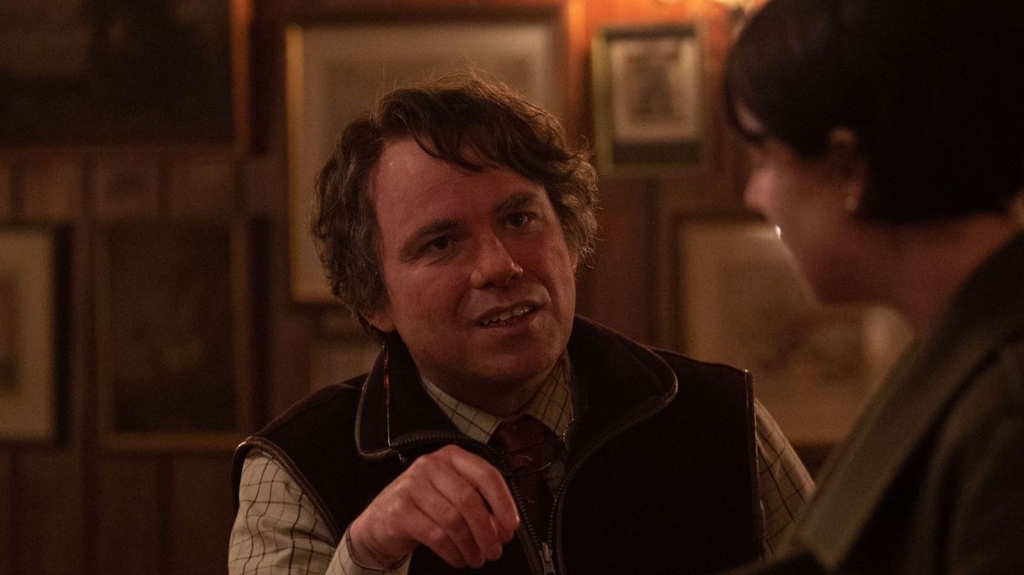
It brings to mind early rape and revenge films in which the perpetrators of gendered violence were strangers (of a distinctively different class than the victims).
For most of the runtime, it seems most of the danger Harper faces is from the men of Cotson. Only at the very end does the film link that to her relationship with her emotionally and physically abusive, now deceased husband James (Paapa Essiedu).
Given that women face the biggest danger from their intimate male partners, the film could have tackled the subject of misogyny by highlighting this fact. But the bulk of Men still focuses on the tired trope that the biggest danger to women is men outside of the domestic sphere, who (quite literary in this case) try to break into it.
There is no place here for subtlety. The sense of danger a woman feels in a male-dominated group is palpable, even if the men do not give any signs of being threatening.
When Harper goes to a bar and practically cannot refuse a man paying for her drink, it is not framed as disturbing behavior or a threat of any kind. When she is asked where her husband is and implies she is divorced, the focus is on the lie — rather than how often women must carefully calculate what to suggest about personal relationships to strange men in order to avoid unwanted attention.
These are things a viewer with female experience instantly notices, seeing the all too familiar patterns, but someone without that experience would easily miss.
It brought to mind how a female director dealt with a similar subject matter in Fresh. Early in the film, the protagonist Noa (Daisy Edgar-Jones) walks to her car, with a man seemingly following her. She puts keys between her knuckles and braces herself for danger, only to have the man, clueless of the terror he caused in her, carrying a baby (the universal attribute of innocence and safety) pass by her without incident.
The tension is still there, present in the scene, and felt by the audience as it is conveyed in the acting. It disperses only when the man is revealed to carry a child — a clear signal he cannot be, at that moment, dangerous.
What Fresh conveys, and where Men miss the mark, is that a woman will feel in danger simply if men are around her…just because they potentially can be deadly.
The metaphor of Men cannot handle its titular grand subject.
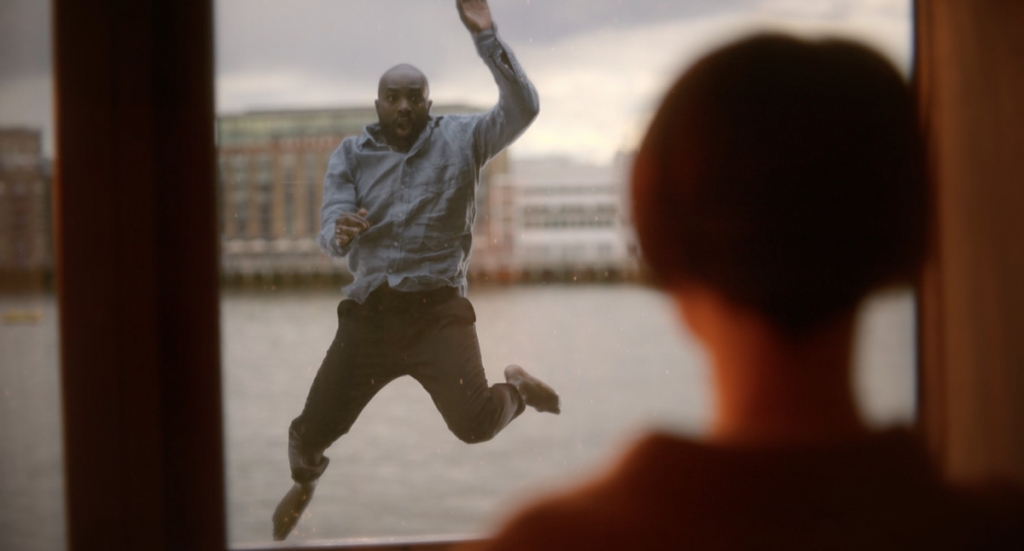
What do men mean in this picture?
Seemingly, they are a homogenous group, down to being physically identical to each other. It is a group that is white, non-migrant, able-bodied, leaning toward Christianity, mostly working class, implied to be heterosexual and cisgender.
And who does their violence affect? Harper, who is upper class white, hetero and cisgender, able-bodied Londoner.
These are the elements Garland uses to tell his audience the, supposedly revolutionary, thesis that men present danger to women.
I understand that a 100 minute long horror cannot capture the complexities of societal relationships and do not demand that. But why is it that a successful director cannot understand that, and instead opts to present gender relations in a flattened out story about how men are simply universally evil with no acknowledgement of how religion, or race, or class or a myriad of other aspects play into the gender relations?
Strangely, the film actually does seem to try to bring into the story the nuance of race; the only man not played by Kinnear is James, Harper’s dead husband. The film however does not do anything about the topic of racialized gender relationships or even problematise its portrayal of violence of a black man towards a white woman — something that so often in cinema was used as a justification or even a righteous reason for white men to inflict vengeful violence towards men of color.
It simply has a black actor play a character, who might have been of any other race, as the film seems to not be concerned with the very existence of race as a construct that heavily influences gender relations.
Another reason why Men fails so miserably is how it stands in one leg in allegory and another in very concrete reality.

In contrast to another recent horror that also engaged with the feminist thought and biblical themes, 2017’s mother!, Garland’s picture pales.
Mother! takes on a similar in proportion subject — the biblical history of humanity from its creation through modern time to the apocalypse — and spins it as a domestic drama descending into surrealism.
While not without flaws, what mother!’s metaphor does greatly is its generality.
The characters are not even named in the film, credited only as Him and Her. The house in which they live is in the middle of nowhere, lacking characteristics that would put it in specific place and time. Him and Her are clearly God and Mother Earth respectively, their house is the world, and they are nothing else.
In Men, however, things are in a strange in-between.
Harper lives in London, and it is not a stock city; it is clearly London with the Shard in the background, with streets empty alluding perhaps to the Covid pandemic. Even when she enters Cotson’s dream-nightmare space, it is still firm in reality. The house in which she is staying in has a history, the place can be found on the map and driven to easily.
The surreal presence of the identical men and slowly tightening hold they have on Harper that culminates in a bizarre finale does not match how other aspects of the film are grounded in realism.
The metaphor and reality are disjointed.

For most of the film, they appear as if they belong to two different pictures.
It is especially a shame because Garland managed to have directed skillful metaphorical pictures such as Ex Machina which is a great example of posthuman feminist art and a well-done modern retelling of the Galatea myth.
The movie also cannot really decide whether it really is the primordial evil of men that is truly to blame for what is happening to Harper.
Maybe it is her actions.
When she arrives in the village, one of the first things she does is pick up an apple which, just a moment later (in case the audience somehow hasn’t picked up on that), is literally called the forbidden fruit. You know, the action that not only condemned humanity to mortal life according to Christian mythology but also is the main reason in it for the subservient position of women and proof of them needing to be controlled and punished by men.
This mudding of the waters of the allegory would not be all too bad; even in allegory, there is space for nuance.
However, what Garland fails to communicate is where his film stands on that problem. Is Harper, and by extension women, guilty of the violence they experience, or is that simply an excuse? The film certainly suggests that might be the case.
Garland uses the biblical metaphor, as well as the Green Man — a symbol of recurrence and circularity of nature — as if to claim that male malevolence has been present since creation and is simply part of the way of the natural world.
What does that leave the viewer with?
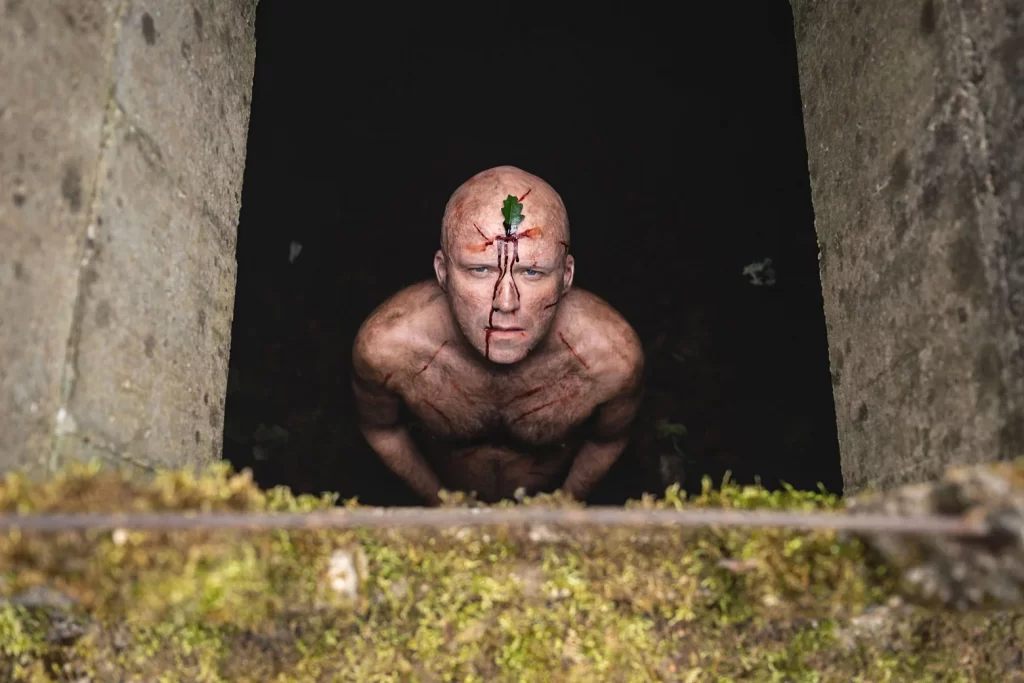
Is it to simply say, “Well, sucks to be female, I guess nothing can be done”?
It certainly seems so, as the film lacks any suggestion that the very reason why women are subservient in mythologies and even biological theories is because of patriarchy, and they simply perpetuate it rather than cause it all together.
Every now and again, the conversation about who should be allowed to tell certain stories resurfaces. Should straight people play queer characters? Should able-bodied people write roles for disabled actors?
Alex Garland’s MEN is a great example of how, if you want to write a film about how women feel oppressed by men, it would be best to leave that to someone who knows what it’s like.
The film does give a certain, incredibly limited snippet of what gendered oppression of (white, heterosexual and able-bodied) women looks like, but it miserably cannot convey how it feels.
In horror, a genre that is so strictly defined by what feelings it induces in its audience, it is a shameful failure.


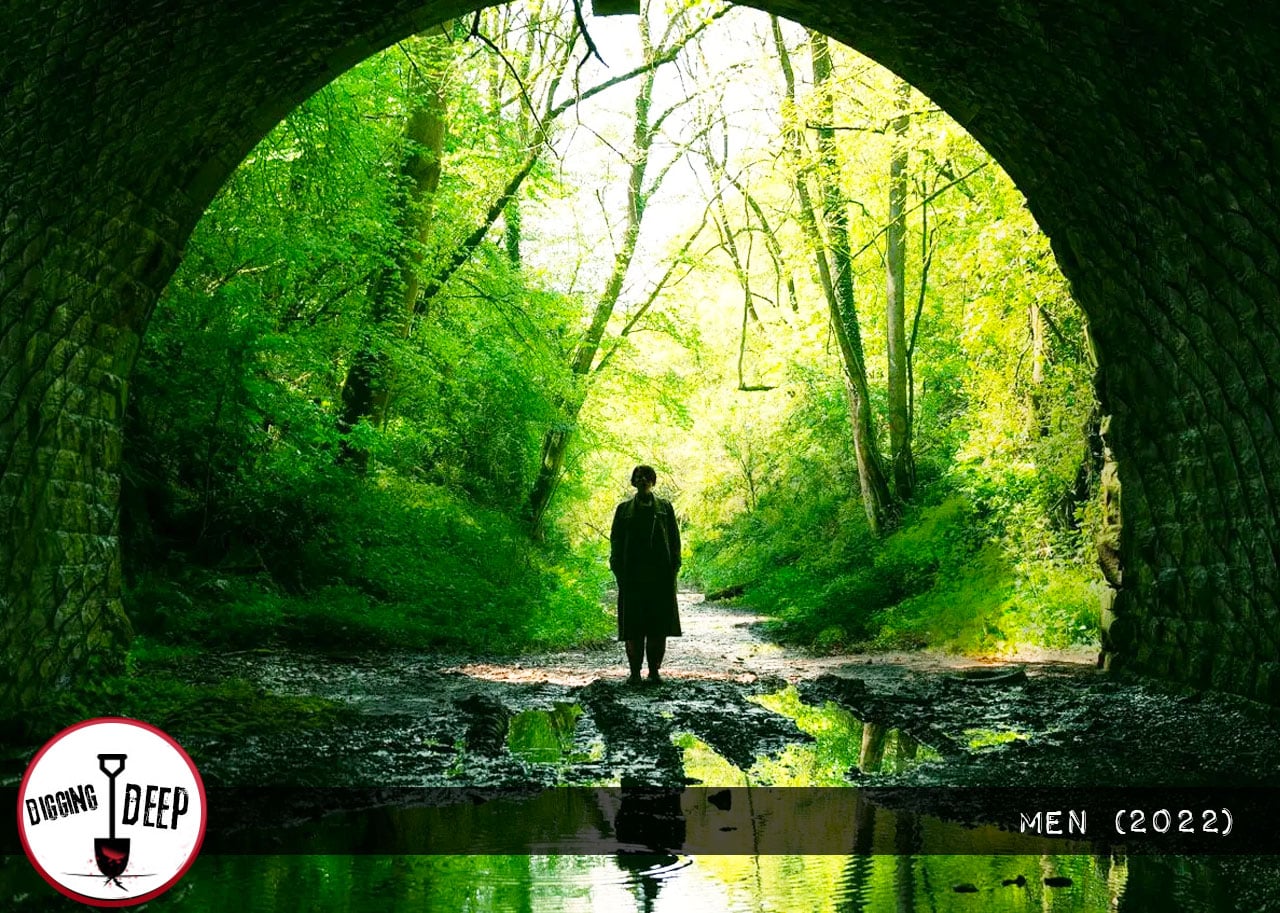











Follow Us!